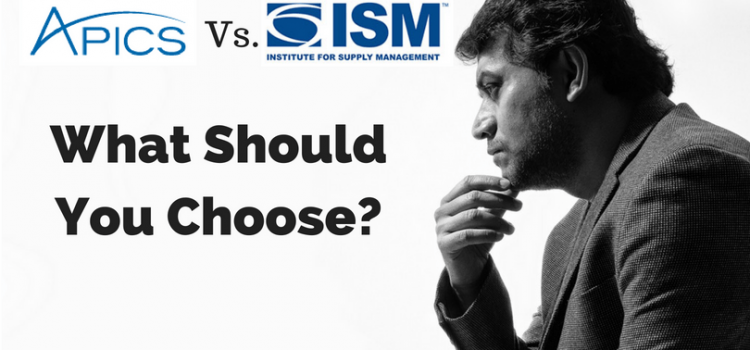With the ever-growing talent and competition in today’s fast-paced environment, everybody is looking for ways and opportunities to outperform their peers. If you want to enhance your supply chain competencies to further your knowledge and stay updated with the current concepts and technologies in the supply chain industry, you can consider getting a professional certification in APICS or ISM or CIPS. To make things easy to understand and choose the certification that suits you best, here are the differences between APICS vs ISM. This will serve as a guide in helping you get an overview and the types of certifications offered by the two associations.
APICS vs ISM – What’s Right for You?
APICS |
ISM |
Organization |
|
| APICS (changed their brand name to the Association for supply chain management), was founded in 1957 , and now has over 117,000 qualified with their certifications and now operates in 82 countries around the world. You can read more information here | Founded in 1915, ISM (Institute for Supply Management) is one of the oldest and largest supply chain associations in the world. It was formerly named National Association of Purchasing Agents (NAPA). |
Background |
|
| APICS is a supply chain management association leaders in research, business, systems and certification programs focused on enhancing supply chain excellence. They strive at transforming businesses by reaching global customers. | ISM is a management association for professionals with keen interest in supply management and procurement. ISM has many features like acquiring various educational qualifications, certificates, training and publications. |
Global Family |
|
| APICS currently has over 45000 members in 100 countries and 300 channel partners. | ISM currently has 50000 members in 90 countries. |
Popular Certifications |
|
| The 3 popular certifications offered are: | The 2 popular certifications offered are: |
Exam Content |
|
| The CSCP exam is :
1 exam 4 hours Can be paper-based or computer-based Offered 3 times a years Candidates must pass two CPIM exams within three years in order to become certified. The CPIM program consists of five modules with two exams, one for Part 1 and one for Part 2. Each module reflects critical areas in production and inventory management. Part 1:Module 1 – Basics of Supply Chain Management Part 2:Module 1 – Strategic Management of Resources |
CPSM – This certification is divided into 3 exams and they can be taken in any order.
Exam 1 – Foundation of Supply Management Exam 2 – Effective Supply Chain Management Exam 3 – Leadership in Supply Management CPSD – This certification consists of 2 exams of which Exam 1 can be waived off if candidates have a CPSM certification. Exam 1 – Foundation of Supply Management Exam 2 – Essentials in Supplier Diversity |
Scoring |
|
| Part 1
Number of exam questions – 150 (130 operational and 20 pretest*) Part 2 Number of exam questions – 150 (130 operational and 20 pretest*) each module weighing 25% CSCP – Exam is 3.5 hours long and has 150 multiple choice questions; 130 scored. The CSCP score range is 200 to 350 |
CPSM – Exam 1 & 2 are both 165 minutes long and consists of 165 questions each, 150 of which are scored. Exam 3 is 180 minutes long and consists of 180 questions, 165 of which are scored.
The required score to pass is between 400- 600. CPSD – Exam 2 is 2 hours long and consists of 120 questions all of which are scored. The required score to pass is 300 |
Eligibility |
|
| APICS CPIM is open to everyone and has no eligibility criteria. Educational background in SCM will come in handy. To be eligible for the APICS CSCP designation you must satisfy one of the following criteria:
* 3 years of related business experience * Bachelor’s degree * CPIM, CFPIM, CIRM, SCOR-P, C.P.M., CSM or CPSM designations |
To be eligible for the ISM CPSM and CSPD designations you must satisfy the following criteria:
* 3 years of related work experience * Bachelor’s degree in a field related to supply chain |
Exam Fees |
|
| CPIM exam fees for:
Part 1- PLUS member price: $495 – Or purchase the CPIM Bundle. Part 2- PLUS member price: $495
CPSP exam fees for – North America CSCP Exam Information PLUS member price: $695 CSCP exam fees for – Outside North America CSCP Exam Information PLUS member price: $1,050 |
CPSM and CPSD exam fees for:
|
Portfolio |
|
| CPIM – Ideal for careers in inventory management & supply chain planning
CPSP – Ideal for general supply chain careers |
Ideal for careers in procurement and developing a diverse supplier base. |
There you have it an APICS vs ISM overview. Although there are differences between the associations, both of these provide certifications which can be very beneficial to your career. Some of the advantages of getting a certifications are:
- Certifications will enhance your resume and make an impression on recruiters
- Increase in salary with every certification achieved
- Enables you to be more efficient and productive, opening multiple career paths
Now that you know the differences between APICS vs ISM, you need to decide what your focus is. Depending on your career goals you need to choose the certifications that works best for you and will lead you to a path of development, improvement and success.
For those of you have taken these exams, please share your experiences and add to my list of APICS vs ISM differences.
Recommended Reading:
This is the guest post from aspiring graduate Pranali Pawar:
Pranali Pawar is a class of 2016 graduate who holds a Master’s degree in Supply Chain & Logistics Technology from University of Houston. Her passion for supply chain management stems from her love for learning, analyzing and solving complex process optimization challenges. Coming from a business family, she has always been intrigued by the impact of people and processes in supply chain and retail management. With her newfound interest for writing, Pranali aims at sharing and gaining knowledge by interacting with industry peers. She is driven to expand her network and build connections with industry professionals, experts and gain insight into their experiences
About the Author- Dr Muddassir Ahmed
Dr MuddassirAhmed is the Founder & CEO of SCMDOJO. He is a global speaker, vlogger and supply chain industry expert with 17 years of experience in the Manufacturing Industry in the UK, Europe, the Middle East and South East Asia in various Supply Chain leadership roles. Dr. Muddassir has received a PhD in Management Science from Lancaster University Management School. Muddassir is a Six Sigma black belt and founded the leading supply chain platform SCMDOJO to enable supply chain professionals and teams to thrive by providing best-in-class knowledge content, tools and access to experts.
You can follow him on LinkedIn, Facebook, Twitter or Instagram











Top procurement blog website you need to remark – Guidance24
[…] With more than 40,000 members, ISM is one of the biggest professional supply management associations in the world. The ISM website offers a variety of useful tools and publications that are free to use after registering. In order to assist you in determining whether certification is most appropriate, I have produced a blog post comparing APICS. Read the article APICS vs. ISM: Which Should You Pick? […]